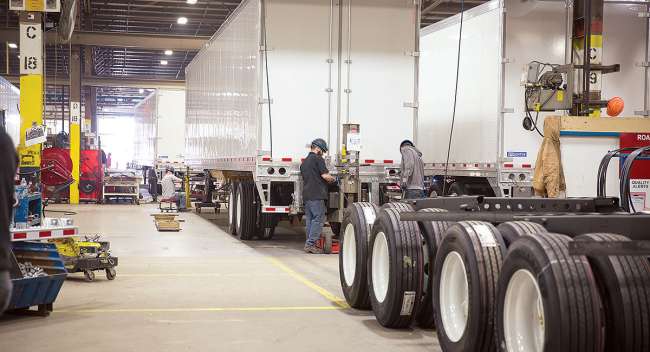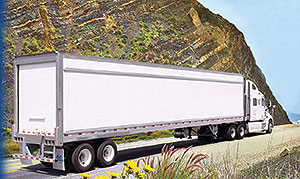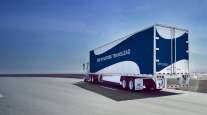Senior Reporter
January Trailer Orders Down 43% Year-Over-Year

[Stay on top of transportation news: Get TTNews in your inbox.]
Net trailer orders in the United States for January underscored that caution remains a central factor in fleets’ equipment purchasing plans, as orders sank to the lowest total of any January in 10 years, ACT reported.
Orders dropped to 15,000, down 43% from 26,169 a year earlier, according to ACT. The next-lowest total stretches back to January 2010, when orders were 7,376.
“It’s a continuation of fleets remaining on the sidelines,” as they did through a good portion of 2019, Frank Maly, director of commercial vehicle transportation analysis at ACT, told Transport Topics. “Purchasing plans have been pared back pretty significantly given current market conditions,” he said.

Hyundai Translead
At the same time, he was more surprised by the bump up in cancellations, which were 1,800 in January.
Also, production rates fell to 881 per day in the month compared with just over 1,000 in December, he said, adding that ACT expects the rates to return to December-like levels moving through the rest of the first quarter.
“Trailer makers are trying to find that equilibrium between orders and production,” he said.
The backlog, with the lower build rate, now reaches into early August. On a year-over-year basis, the backlog is down 54%, he said.
FTR pegged January’s net orders at 16,300.
“We’ve come to this big stopping point,” said Don Ake, vice president of commercial vehicles at FTR. “The fleets are OK with managing what they have now. Typically, the nature of competitive business is you are going after more business. But right now, I don’t think they are.”
From 2016 through 2019, fleets ordered a total of 1.2 million trailers, with 2018 setting an all-time record of 420,000.
Lower orders “had to come,” said Stuart James, chief sales officer at Hyundai Translead. “But it is not as bad as 2008” and the Great Recession, he said.
Nor should they be, he noted, pointing specifically to a recent bump in manufacturing that, eventually, should manifest in heightened freight movement, consumer spending and steady construction activity.
Still, James expects fleets will remain on the sidelines until an entire quarter of good economic news occurs, a wait-and-see attitude that is “impacting both the leasing companies and, in turn, the trailer manufacturers,” he said.
Ake suggested demand for new trailers “could possibly stay this way until November.”
Corresponding to that overall reduced demand will be much more competitive long-term lease rates for new trailers, said Charles Willmott, principal at WillGo Transportation Consulting.
Rental and lease company mergers and acquisitions in the portion of that industry that he monitors — which does not include the largest such companies — also will be very active throughout 2020, beginning late in the first quarter, he said.
Host Seth Clevenger went to CES 2020 in Las Vegas and met with Rich Mohr of Ryder Fleet Management Solutions and Stephan Olsen of the Paccar Innovation Center to discuss how high-tech the industry has become. Listen to a snippet above, and to hear the full episode, go to RoadSigns.TTNews.com.
“Investor interest in the industry is very strong, with lots of money looking for new homes,” Willmott said.
Meanwhile, 2020 “is starting out more challenging than last year, for sure,” said Craig Bennett, senior vice president of sales at Utility Manufacturing Co. For-hire carriers face several related challenges like higher insurance premiums, driver availability, softer rates and lower used truck values.
“When our customers are struggling to be profitable they do not buy much equipment,” Bennett said.
Private fleets and leasing companies, in Bennett’s opinion, are more stable, “for now.”
Other uncertainties revolve around the ongoing coronavirus and its widening effect on trade. Also, there’s the emerging USMCA trade deal, which Canada has yet to sign, but is expected to in April. Assuming that happens, however, mountains of details will remain to be dealt with.
Another trailer manufacturer executive, more optimistically, maintained that what’s occurring is a return to normal order patterns.
The industry should expect “normal ordering numbers for quite a while, years,” said David Giesen, vice president of sales at Stoughton.
This current order level also reflects what is needed to keep the overall trailer fleet at its present average age of about 6.7 years, which is as low as it has been in the last 20 years, Giesen said. The average age was as high as 8.9 years in 2010.
The future of efficient hauling and delivery is today—and it's all in booth 3433 at #TMCAnnual20. We're showcasing our breakthrough technologies and equipment solutions that are changing how the world reaches you. #wabashnational, #solutions #transportation pic.twitter.com/hGdjZmB1ZW — Wabash National (@WabashNational) February 19, 2020
In related news, Wabash National Corp., the nation’s only publicly traded trailer manufacturer and the largest trailer maker, is forecasting full-year revenue dropping to between $2.05 billion to $2.15 billion compared with a record $2.3 billion in the 2019 period. But a large backlog at the company awaits and leads Wabash CEO Brent Yeagy to believe the company’s share will expand in 2020.
“We’re not going to get into what that share number is at this point, but we do clearly see the fruits of our labor is paying off,” said Yeagy during the company’s latest earnings call. “Wabash products already touch everything in the logistics chain; nothing moves without our products.”
Wabash had a backlog worth $1.1 billion in the fourth quarter, an increase of $300 million compared with the third quarter.
Want more news? Listen to today's daily briefing:





